|
|
|
Sort Order |
|
|
|
Items / Page
|
|
|
|
|
|
|
| Srl | Item |
| 1 |
ID:
187737
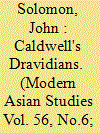

|
|
|
|
|
| Summary/Abstract |
This article examines British Protestant missionary scholars' representations of Tamil culture and history, analysing how this form of knowledge evolved in relation to missionary concerns and the intellectual trends of nineteenth-century India. I focus on the work of Robert Caldwell, whose scholarship had a profound influence on the identity discourses of twentieth-century Tamil nationalism. I situate Caldwell's work in ethnography and philology within the broader field of colonial knowledge produced about Tamils in nineteenth-century India and within a broader study of British missionary concerns in South India. I examine two of Caldwell's publications to argue that his later work, far from being driven by mere scholarly interests, was also shaped by his concerns as a missionary, and that his evolving scholarship mirrored the development of anti-Brahmanism in British Protestant missionary circles of the time. Missionary anti-Brahmanism arose as a response to the caste system, which missionary groups came to regard as the biggest obstacle to Christian conversions. Departing from some of his earlier ideas, Caldwell strategically positioned his later work to challenge Brahman influence, which he saw as being intrinsically tied to the strength of caste sentiment in Indian society. Caldwell's construction of a discursive framework for understanding Tamil linguistic identity was informed by public reactions to his first publication and his subsequent understanding of the dynamic relationship between European scholarship and Indian social relations. More broadly, this article demonstrates the close relationships between Protestant Christian missionary activity, Indian social politics, and the field of knowledge production in colonial South India.
|
|
|
|
|
|
|
|
|
|
|
|
|
|
|
|
| 2 |
ID:
187738
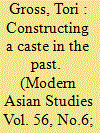

|
|
|
|
|
| Summary/Abstract |
This article examines the recent political history of the Devendrakula Vellalars (henceforth, Devendras). Officially recognized by the state and union governments in 2020 and 2021, this novel consolidated caste formation includes a broad range of formerly endogamous ‘Untouchable’ communities spread throughout Tamil Nadu but most highly concentrated in its southern half. I argue that the communities constituting the Devendras have been socio-economically diverse for at least the past century and thus do not necessarily share the same political priorities. They have, nonetheless, attempted to unite in opposition to the politically powerful Thevars (Other Backward Class or OBC) who are themselves a consolidated caste formation that grew out of colonial domination. The Devendras's economic diversity has, however, troubled their oppositional political consolidation, compelling the production of revisionist mythico-histories that appeal to widely held desires for authority and honour. Disavowing the Dalit past and recasting the Devendras as the descendants of heroes, such mythico-histories produce a collective identity characterized by the ideals of righteous self-sacrifice, valour, and agrarian civility. Devendras's identarian claims are, however, reliant on the acceptance of internal and external audiences, some of which violently oppose their assertions. They nevertheless seek recognition, and in so doing empower themselves by gathering strength in numbers.
|
|
|
|
|
|
|
|
|
|
|
|
|
|
|
|
| 3 |
ID:
187740
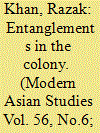

|
|
|
|
|
| Summary/Abstract |
This article examines often ignored ‘minority entanglements’ forged between European Jewish and South Asian Muslim intellectuals in Germany and traces their evolution in colonial India. The article focuses on three individual life histories and situates them within the more extensive Jewish-Muslim intellectual dialogue that resonated in the inter-war period. It brings to light the lives and writings of Josef Horovitz (1874–1931), professor of Arabic at the Muhammadan Anglo-Oriental College, Aligarh, and a prolific contributor to the journal Islamic Culture published in Hyderabad; Leopold Weiss alias Muhammad Asad (1900–1992) in Islamia College, Lahore, who also served as the editor of Islamic Culture, Hyderabad; and educationist and reform pedagogue Gerda Philipsborn (1895–1943) at the Jamia Millia Islamia, Delhi. The intellectual dialogue between minority communities, together with the contribution it made both to modern Islamic studies as a discipline and the forging of a new reform pedagogy, allow us to rethink the Jewish and Muslim question as well as the minority response to it through a comparative perspective. The minor history of European Jewish and South Asian Muslim entanglements makes for a rich testimony to the problems and possibilities of studying minorities as the makers of minor cosmopolitan knowledge.
|
|
|
|
|
|
|
|
|
|
|
|
|
|
|
|
| 4 |
ID:
187736


|
|
|
|
|
| Summary/Abstract |
This article explores the anthropometric survey of 5,000 Tibetans by the ethnographer HRH Prince Peter of Greece and Denmark in the northeast Indian Himalayan town of Kalimpong in the 1950s, as part of the Third Danish Expedition to Central Asia. In the context of the crisis created by the Chinese incursion into Tibet in 1950, which pushed thousands of Tibetans into India, stationary field anthropometry, rather than a mobile expedition, became Prince Peter's principal entry into Tibetan worlds. This article explores the scientific paradigms underpinning his anthropometric survey at a time when anthropology had seemingly moved on theoretically and ethically, the historical conditions and contingencies of Prince Peter's research, and the survey's representations of Tibetan peoples and places. We argue that, while Prince Peter's understanding was in essence primordialist, linking particular peoples to particular places, in practice he took a more modernist approach to ‘Tibetaness’ as contingent upon historical processes. The article concludes by reflecting on the potential significance of this vast and unique collection of historic anthropometric data for Tibetans today.
|
|
|
|
|
|
|
|
|
|
|
|
|
|
|
|
| 5 |
ID:
187745


|
|
|
|
|
| Summary/Abstract |
Writing in the Malay-language press from the late 1910s to the 1930s, literate women in colonial Java and Sumatra engaged deeply with understandings of modernity mediated through concepts of healthfulness and hygiene. Piecing together the views of writers who participated in conversations about health, child-rearing, child-feeding, and socio-political progress, and situating them against the backdrop of both imperial policies of hygienic modernity and systems of indigenous knowledge, this article argues that these women deployed their own agency and negotiation efforts to articulate a singular paradigm of progress. The article focuses on practices of infant-feeding, showing that these literate colonized women's conscious manipulation of the colonial discourse on scientific modernity was grounded in their awareness of the racial project of control of their own bodies. The promotion of ‘traditional’ breastfeeding was a way to affirm a path to progress that shared the underlying conditions for, but not the modalities of, Western modernity. Examining the processes of negotiation and subversion that emerged in these women's writings provides a productive space to question and reframe scholarly understandings of ‘modernity’ as a category of analysis.
|
|
|
|
|
|
|
|
|
|
|
|
|
|
|
|
| 6 |
ID:
187741


|
|
|
|
|
| Summary/Abstract |
Through an engagement with the histories of Muslim pasts, presences, and absences in the locality of Jangpura-Bhogal in the Indian capital city of Delhi, this article examines the constitutive relationship between displacements and city-making. It addresses Jangpura-Bhogal's post-colonial history (1947–present) through instances of the erasure of Muslim property, spaces, and histories, and the reoccupations, replacements, and redefinition of spaces, properties, and memories that they constituted. The article shows how protracted material displacements of Muslim property and spaces have contributed to the erasure of a Muslim historical presence from Jangpura-Bhogal. By tracing the afterlives of these material displacements, it tracks how narrative discourses draw on these Muslim absences and the sense of an abstract ‘diverse space’ to produce new sets of exclusions and practices of Othering in the present. The discussion focuses on the processual/everyday, ‘below the radar’, and, at times, invisible displacements, more than sudden eruptions of violence or overt ideological projects aimed at a deliberate Muslim erasure. Thus, Delhi's post-colonial history is not only about the well-rehearsed story of migrations and arrivals but equally about departures and displacements that have produced the neighbourhood and the city as particular kinds of majoritarian places and spaces. Current acts of Muslim displacement, that is, the Delhi ‘riots’ of February 2020 are enabled not only through visible and violent histories of Muslim marginalization, but also by longer histories of non-overt erasures, displacements, and replacements.
|
|
|
|
|
|
|
|
|
|
|
|
|
|
|
|
| 7 |
ID:
187742
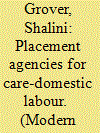

|
|
|
|
|
| Summary/Abstract |
Survey data on Indian labour points to a rapid expansion of the care-domestic economy, currently the main employment avenue for urban women. Hitherto, studies on domestic service portray the unequal class structures of master–servant relationships and the escalating phenomenon of live-out and part-time hired help. This article shifts the focus to under-researched, yet increasingly visible, placement agencies, which regulate care-domestic markets and provide diverse services, from specialized ‘patient care’ to the training of subaltern communities. The article discusses how these service providers denote prominent shifts in skill sets, intra-household care arrangements, forms of medical assistance, and new (and old) mechanisms of authority. The ethnography expands our knowledge of everyday mediations around hiring and training between agencies, employers, and care-domestic workers in New Delhi. The article puts forward innovative conceptualizations of service provider approaches through juxtaposing the informal practices of local (or Indian) agencies with formalized and ‘civilizing’ agendas developed by Euro-American intermediaries. The formal–informal dichotomized framework of service provider relationships adds to critical scholarship that contrived dualisms which need historical scaffolding and nuanced engagement. I argue that, while informal and formal approaches appear markedly different for the care-domestic economy, they also overlap. Significantly, both approaches are unjustly weighted against the workers who lack the potential to democratize labour relations. Local agencies reinforce exploitative care-domestic relationships, while Euro-American intermediaries, who espouse modern values, formalization, and civilizing experiments, promulgate punitive regimes and stigmatized futures for their Indian subjects.
|
|
|
|
|
|
|
|
|
|
|
|
|
|
|
|
| 8 |
ID:
187744


|
|
|
|
|
| Summary/Abstract |
In 1890, the Maldivian judge and poet Sheikh Muhammad Jamaluddin connected poetry with linguistic description in two ways. First, when he described features of the Dhivehi language with the aid of Arabic linguistic theory, he used Dhivehi poetry as linguistic evidence for correct usage. Second, he authored Dhivehi-language poetry about Arabic linguistic theory. Cosmopolis scholarship relates a narrative of how the wide circulation of Sanskrit, Arabic, and/or Persian fostered a vast network of writers who authored texts in major vernacular languages like Bengali, Burmese, Javanese, Kannada, Khmer, Malay, Sinhala, Tamil, Telugu, Thai, Tibetan, Turkish, and Urdu. This scholarship suggests that authors living within a particular cosmopolis wrote in divergent vernacular languages yet were, in some sense, connected because they translated and responded creatively to the same widely circulated source texts written in Sanskrit, Arabic, and/or Persian. Yet in cosmopolis scholarship's effort to reveal understudied connections, various degrees of disconnection among writers of vernacular languages within a cosmopolis tend to be missed. One problem of overlooking disconnection among writers of vernacular languages is that readers could mistakenly conflate superculture-subculture interaction with intercultural interaction. In this article, I argue that Dhivehi-language poetry and linguistic description was inside the Arabic cosmopolis but simultaneously outside, because in circa 1890 non-Maldivians in the Arabic cosmopolis of South and Southeast Asia could not even read the Thaana script of the Dhivehi language.
|
|
|
|
|
|
|
|
|
|
|
|
|
|
|
|
| 9 |
ID:
187739
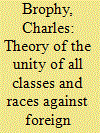

|
|
|
|
|
| Summary/Abstract |
Based on the writings of James Puthucheary in the late 1950s and early 1960s, this article seeks to highlight Puthucheary's contribution to debates within the Malayan Left on the national question. It will highlight Puthucheary's situating of the Malayan Left within a wider transnational flow of nationalist, anti-imperialist, and socialist thought, as well as his attempt—through his own Marxist-influenced assessment of the Malayan situation—to answer the political problem of the relationship between socialist politics and nationalism in Malaya. In doing so the article will highlight the way in which Puthucheary's own position on questions of education and language policy placed him in opposition to dominant trends within the Malayan Communist Party and the left-wing of the People's Action Party, provided a theorizing of the need for nation-building within Malayan socialism, and contributed towards a socialist politics which placed emphasis upon economic development and cultural nation-building from the perspective of the Malay peasantry. The article finally goes on to explore Puthucheary's subsequent disengagement from politics in the early 1960s and the growing limitations of a socialist politics of nation-building in Malaya, which led Puthucheary and others on the Left to contribute towards a programme of nation-building within existing institutions and parties in the 1960s and 1970s.
|
|
|
|
|
|
|
|
|
|
|
|
|
|
|
|
| 10 |
ID:
187743


|
|
|
|
|
| Summary/Abstract |
Through the lens of the multinational staff of the Chinese Maritime Customs Service (CMCS), this article argues that a technocratic programme of reconstruction evolved in the Nationalist government's wartime efforts on post-war planning, which refashioned a cadre of foreign (semi-)colonial-era experts into technocrats serving a sovereign state. This episode, in which the weakened Customs Service reclaimed its significance for the Chinese state, occurred in China's wartime capital, Chongqing. After the abrogation of the so-called ‘unequal treaties’ with foreign powers in January 1943, China entered a post-treaty era, and the question of retaining long-serving foreign Customs Service employees perplexed Nationalist leaders. Eventually, China's huge post-war need for foreign expertise, networks, and imports led to a moderate staff reorganization of the CMCS, with foreign technocrats being kept on and other bureaucrats either shifted to advisory positions or being forced to retire. Technical expertise provided a new guise for the European and American presence in post-imperialist China. Taking the rehabilitation of coastal lighthouses as an example, this article demonstrates the significance of foreign technocrats to the Chinese state during the last phase of the Sino-Japanese War and in its immediate aftermath. In showing the ambition and preparations of the Nationalist government for a post-war era, this article corrects a narrative of an all-out collapse of the Nationalist government from the mid-1940s. The wartime evolution of the Customs Service further highlights the growing importance of technocrats in the decolonizing world.
|
|
|
|
|
|
|
|
|
|
|
|
|
|
|
|
|
|
|
|
|